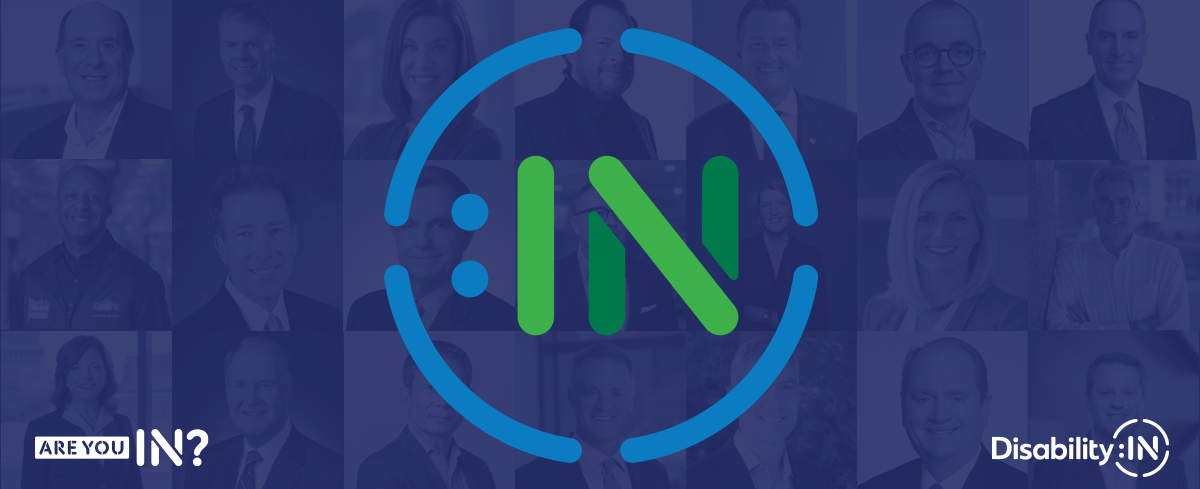By Jill Houghton, CEO
When we first created the CEO Letter on Disability Inclusion one year ago, we knew we wanted it to be a leadership driven campaign where CEOs could call on their peers to commit to disability inclusion across their enterprise. The nation’s top executives would agree to carry out tangible actions to further equality and inclusion in business, from hiring inclusively, contracting with disability-owned business enterprises and creating accessible tools and technology for all within their companies.
Specifically, the leaders would also call on their peer CEOs to leverage the Disability Equality Index (DEI), a benchmarking tool created by Disability:IN and the American Association of People with Disabilities. The DEI helps companies develop a baseline for their inclusion efforts to date, benchmark against industry competitors, and build a roadmap to achieve disability inclusion in business.
The initial signatories of the 2020 letter—marking the 30th anniversary of the Americans with Disabilities Act—were the CEOs of Accenture, CVS Health, Intel, Microsoft, Voya Financial and Walmart. Rod Martin, Voya Financial (100 on the 2020 DEI) Chairman and CEO said it best: “With our signature, we ask every CEO for their much-needed help in advancing disability equality and inclusion at a time when the need to make sure that no one is marginalized has never been more important.”
Over the last year, we’ve had so many corporate leaders join our cause across financial, technology and healthcare sectors, bringing the total number of CEOs to over 50! From T-Mobile (100 on the 2020 DEI), whose President and CEO Mike Sievert signed in July and said in a recent blog post that people with disabilities “navigate a world that isn’t necessarily built for them [making] them natural, intuitive innovators” for companies that attract them through dedicated hiring initiatives.
Or Marc Benioff, Chairman and CEO of Salesforce (100 on the 2020 DEI), who signed in October. Last year, Salesforce created the Office of Accessibility, led by a Chief Accessibility Officer, to increase the accountability and transparency of its products, customer events and workplaces across the company.
Or Gianrico Farrugia, M.D., President & CEO of Mayo Clinic (100 on the 2020 DEI), where its employee resource group for people with disabilities hired a full-time disability recruiter and also launched the Self-Identify Campaign, an invitation to voluntarily self-identify as a person with a disability.
To today, where we are thrilled to have commitments from the CEOs of Eli Lilly and Company, Target and Cargill, with more names on the way. In signing the letter, Lilly (100 on the 2020 DEI) Chairman and CEO Dave Ricks says, “Lilly needs top people with critical skills, expertise and talents. Some of them have disabilities now—or will in the future. We’re working to remove barriers to ensure that everyone can contribute fully, because we can’t afford to miss out on anyone’s contributions.”
Every CEO who has signed the letter has seen its company take the DEI or sign up to take the assessment this year. Nearly one-third (28%) of Fortune 500 companies and more than half (59%) of Fortune 100 companies currently use the DEI, with those earning a score of 80 and above and recognized as a “Best Places to Work for Disability Inclusion.”
And there’s a good business reason, too. Accenture research shows that companies that qualify as DEI “champions”—meaning they are committed to strengthening the bridge between business and the disability communities—achieved on average 28% higher revenue over a four-year period, double the net income and 30% higher economic profit margins.
We’re so proud of the more than 50 CEOs who recognize that disability inclusion is critical for building sustainable futures. These corporate leaders are prioritizing cultural diversity, innovation, and employment opportunities for people with disabilities to deliver positive impact and outcomes for their company, employees, and stakeholders.
If you’d like to learn more about DEI and how it can help your company develop and achieve your disability inclusion goals for 2021, visit and register by February 12 at disabilityequalityindex.org. Registrants have until April 9, 2021 to complete the assessment and be eligible for the 2021 Best Place to Work award.


